Keynote Speakers
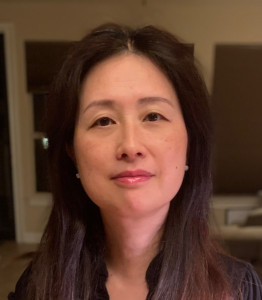
Ying Ding, Bill & Lewis Suit Professor at School of Information, University of Texas at Austin
Title: Knowledge Graph and Beyond
Abstract: Knowledge graph (KG) is becoming the foremost driving force to enable the Artificial Intelligence (AI). Like human brains, knowledge graphs are the brains for machines that can connect disparate data, perform cognitive inference, and most importantly, derive insights from the vast amount of heterogeneous data. Gartner predicted that knowledge graph application and graph mining will grow 100% annually through 2022 to enable more complex and adaptive data science. In regard to the black box nature of AI algorithms, explainable AI becomes indispensable for applications which demand transparent decision making. Knowledge graph can play an essential role to decipher the hidden connections and complex contexts into traceable paths. This talk will showcases the general understanding of knowledge graph including constructing and mining knowledge graphs, and its applications in drug discovery, medical imaging diagnosis, and COVID-19.
Bio: Dr. Ying Ding is Bill & Lewis Suit Professor at School of Information, University of Texas at Austin. Before that, she was a professor and director of graduate studies for data science program at School of Informatics, Computing, and Engineering at Indiana University. She has led the effort to develop the online data science graduate program for Indiana University. She has published 240+ papers in journals, conferences, and workshops, and served as the program committee member for 200+ international conferences. She is the co-editor of book series called Semantic Web Synthesis by Morgan & Claypool publisher, the co-editor-in-chief for Data Intelligence published by MIT Press, and serves as the editorial board member for several top journals in Information Science and Semantic Web. She is the co-founder of Data2Discovery company advancing cutting edge AI technologies in drug discovery and healthcare. Her current research interests include data-driven science of science, AI in healthcare, Semantic Web, knowledge graph, data science, scholarly communication, and the application of Web technologies.

Chris Clifton, Professor of Computer Science and (by courtesy) Statistics, Purdue University
Title: Limitations on Malicious Secure Protocols
Abstract: Multiparty secure protocols are based on underlying participant models, ranging from semi-honest (participants abide by the protocol, but may try to later gather extra information from what they’ve seen; to fully malicious, where multiple participants may collude and violate the protocol to learn things they shouldn’t. While MPC provides powerful cryptographic tools, we show that in many cases, the practical value of stronger participant/adversary models is limited. This talk will provide an overview of secure multiparty computation, explain the formal limitations on use with malicious participants, and discuss practical applications in cases where participants must be assumed semi-honest. We demonstrate some of the subtleties and how to address them with an example from data privacy: using secure multiparty computation to satisfy Local Differential Privacy. This talk is based on material that appeared in GameSec 2019, “When is a Semi-Honest Secure Multiparty Computation Valuable?”, with Dr. Radhika Bhargava; and in PST’15, “Laplace noise generation for two-party computational differential privacy”, with Dr. Balamurugan Anandan.
Bio: Dr. Clifton works on data privacy, particularly with respect to analysis of private data. This includes privacy-preserving data mining, data de-identification and anonymization, computing with encrypted data, and limits on identifying individuals from data mining models. He also works more broadly in data mining, including fairness issues, data mining of text, and data mining techniques applied to interoperation of heterogeneous information sources. Fundamental data mining challenges posed by these applications include skew and bias in learning, extracting knowledge from noisy data, identifying knowledge in highly skewed data (few examples of “interesting” behavior), and limits on learning. He also works on database support for widely distributed and autonomously controlled information, particularly issues related to data privacy. Prior to joining Purdue in 2001, Dr. Clifton was a principal scientist in the Information Technology Division at the MITRE Corporation. Before joining MITRE in 1995, he was an assistant professor of computer science at Northwestern University. He has a Ph.D. (1991) and M.A. (1988) from Princeton University, and Bachelor’s and Master’s degrees (1986) from the Massachusetts Institute of Technology. From 2013-2015 he served as a rotating program director in the Division of Information and Intelligent Systems and the Secure and Trustworthy Cyberspace Program at the National Science Foundation. He is a Fellow of the IEEE and a Distinguished Member of the ACM.
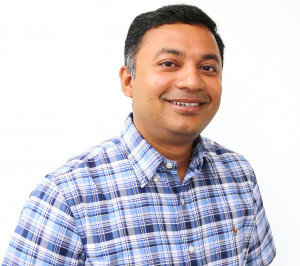
Mohammad Abdullah Al Faruque, Associate Professor, Department of Electrical Engineering & Computer Science, Department of Computer Science, Department of Mechanical and Aerospace Engineering, University of California, Irvine
Title: Cross-Layer Security of Embedded and Cyber-Physical Systems in the Era of Internet-of-Things
Abstract: Cyber-physical systems (CPS) are engineered systems built from, and depend upon, the seamless integration of computation and physical components [NSF]. Embedded systems comprising of hardware and software systems are the major enabling technology for these cyber-physical systems. Moreover, when the cyber-physical systems get connected to the Internet, it forms the Internet-of-Things (IoT). Today, CPSs can be found in security-sensitive areas such as aerospace, automotive, energy, healthcare, manufacturing transportation, entertainment, and consumer appliances. Compared to the traditional information processing systems, due to the tight interactions between cyber and physical components in CPSs and closed-loop control from sensing to actuation, new vulnerabilities are emerging from the boundaries between various layers and domains. In this keynote talk, Prof. Al Faruque will discuss how new vulnerabilities emerge at the intersection of various components and subsystems and their various hardware, software, and physical layers. Several recent examples from various cyber-physical systems will be presented in this talk. To understand these new vulnerabilities, a very different set of methodologies and tools are needed. Defenses against these vulnerabilities also demand new hardware/software co-design approaches. The talk will highlight recent developments in this regard. This talk’s major goal will be to highlight various research challenges and the need for novel scientific solutions from the NSYSS research community and definitely from the larger embedded systems, distributed computing systems, design automation, computer architecture, and Internet-of-things research communities.
Bio: Mohammad Al Faruque received his B.Sc. degree in Computer Science and Engineering (CSE) from Bangladesh University of Engineering and Technology (BUET) in 2002, and M.Sc. and Ph.D. degrees in Computer Science from Aachen Technical University and Karlsruhe Institute of Technology, Germany in 2004 and 2009, respectively. He is currently with the University of California Irvine (UCI) as an Associate Professor and Directing the Embedded and Cyber-Physical Systems Lab. He served as an Emulex Career Development Chair from October 2012 till July 2015. Before, he was with Siemens Corporate Research and Technology in Princeton, NJ as a Research Scientist. His current research is focused on the system-level design of embedded and Cyber-Physical-Systems (CPS) with a special interest in low-power design, CPS security, data-driven CPS design, etc. He is the author of 2 published books. Besides many other awards, he is the recipient of the School of Engineering Mid-Career Faculty Award for Research 2019, the IEEE Technical Committee on Cyber-Physical Systems Early-Career Award 2018, the IEEE CEDA Ernest S. Kuh Early Career Award 2016, Thomas Alva Edison Patent Award 2016 from the Edison Foundation, the 2016 DATE Best Paper Award, the 2015 DAC Best Paper Award, and the 2009 IEEE/ACM William J. McCalla ICCAD Best Paper Award. He is also the recipient of the UCI Academic Senate Distinguished Early-Career Faculty Award for Research 2017 and the School of Engineering Early-Career Faculty Award for Research 2017. Besides 120+ IEEE/ACM publications in the premier journals and conferences, he holds 8 US patents. Moreover, his work has been featured in the New York Times, the Los Angeles Times, Newsweek, ACM Communication, Science Magazine, etc. among many other national and international newspapers and magazines. Prof. Al Faruque’s research is currently funded by NSF, NIH, DOE, DoD, DARPA, DOT, DoEd, ONR, UCOP, Caltrans, and several industries. Among many important professional service roles, Dr. Al Faruque is the program chair of the premier conference ACM/IEEE International Conference on Cyber-Physical Systems (ICCPS) 2021 and the general chair for ICCPS 2022.

Chris Jermaine, Professor, Computer Science, Rice University, USA
Title: Machine Learning for Computer Program Synthesis
Abstract: Computer program synthesis is the task of programming a computer to write new computer programs. It is an old idea, and little progress has been made over the decades. However, it is now viewed with renewed urgency. Computers are a ubiquitous part of modern life, with computer programs running in everything from cars to smartphones to refrigerators, and yet qualified programmers are few and far between.
Program synthesis is a difficult task, but one thing that may make it easier is the widespread availability of relevant data. Currently, there are millions of open source computer codes available, and one idea is to use an artificial intelligence to process all of those codes and somehow “learn” how to write new computer programs. The result of this learning is effectively a prior distribution over computer programs; when it is time to use user input to synthesize a new program, this can be seen as a Bayesian update that results in a posterior over programs. In this talk, I will detail our efforts along these lines, that are embodied in a synthesis system called Bayou.
Bio: Chris Jermaine is a Professor of Computer Science and Director of the Data Science Initiative at Rice University where he studies data management and analytics. He is the recipient of an Alfred P. Sloan Foundation Research Fellowship, a National Science Foundation CAREER award, an ACM SIGMOD Best Paper Award, and a IEEE ICDE Best Paper Award. He is editor-in-chief of ACM Transactions on Database Systems.
Invited Speakers
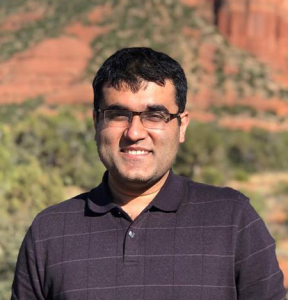
Syed Rafiul Hussain, Assistant Professor, Department of Computer Science and Engineering, Pennsylvania State University
Title: Building Security and Privacy from the Ground up for Complex Networks and Systems.
Bio: Syed Rafiul Hussain is currently an Assistant Professor in the Department of Computer Science and Engineering at Pennsylvania State University. Before joining Penn State, he worked as a postdoctoral researcher at Purdue University from where he also received his Ph.D. in December 2018. His research interests broadly lie in network and systems security with a focus on the fundamental improvement of security and privacy analysis of emerging networks and cyber-physical systems, including cellular networks and Internet-of-Things. His papers have received awards and nominations, including ACSAC’19 distinguished paper award, NDSS’19 distinguished paper award honorable mention, and ACM SIGBED EWSN’17 best paper award nomination. He has been inducted twice in the Hall of Fame Mobile Security Research by GSMA for his contribution in identifying 20+ new protocol flaws in 4G and 5G cellular networks. His findings led to several changes in the 4G and 5G cellular protocol designs and in operational networks. His work has been featured by mass media outlets worldwide, including the New York Times, Washington Post, Forbes, MIT Technology Review, ACM TechNews, and The Register.
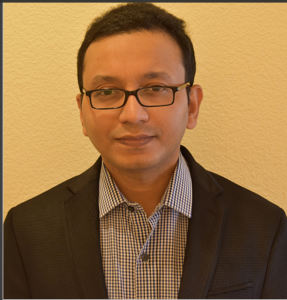
Jalal Mahmud, Manager of Speech and NLP Products, Master Inventor, IBM Almaden Research Center.
Title: Deriving tone, emotions and sentiment from text
Bio: Jalal Mahmud is a research scientist, master inventor and tech lead at IBM Almaden research center. Currently, he is managing teams developing NLP and Speech technologies for IBM Watson. Previously, he drove the development of IBM Watson Sentiment across multiple languages, accelerated innovations to several natural language understanding products including Sentiment, Entity, Keyword and Categories. Before that, he served as a technical lead for several Watson products such as personality insights, tone analyzer and emotion modeling. He received PhD in Computer Science from Stony Brook University in 2008. Dr. Mahmud published 80+ papers in top-rated conferences and journals, received several best paper nominations and regularly serve on technical program committees/organizing committees for major international conferences. He is a prolific inventor with 51 issued patents. Dr. Mahmud is a senior member of ACM and an adjunct faculty at University of California, Santa Cruz.

Junaed Sattar, Assistant Professor, Computer Science and Engineering, The University of Minnesota.
Title: Being ‘LoCO’: Design & Experiments With a Low-Cost Open-Source Autonomous Underwater Vehicle
Bio: Junaed is an assistant professor at the Department of Computer Science and Engineering in the University of Minnesota, and a MnDrive (Minnesota Discovery, Research, and Innovation Economy) faculty. He is the founding director of the Interactive Robotics and Vision Lab, also part of the Minnesota Robotics Institute, where they investigate problems in field robotics, robot vision, human-robot communication, assisted driving, and applied (deep) machine learning, and develop rugged robotic systems. His graduate degrees are from McGill University in Canada, and he has a Bachelors-in-Engineering degree from the Bangladesh University of Engineering and Technology. Before coming to the UoM, he worked as a post-doctoral fellow at the University of British Columbia where he worked on service and assistive robotics, and at Clarkson University in upstate New York as an Assistant Professor. Find him at junaedsattar.org, and the IRV Lab at irvlab.cs.umn.edu, @irvlab on Twitter, and their YouTube page at https://www.youtube.com/channel/UCbzteddfNPrARE7i1C82NdQ.
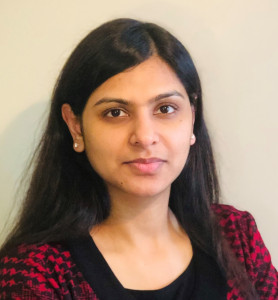
Shagufta Mehnaz, Assistant Professor, Department of Computer Science, Dartmouth College
Title: Security and Privacy Risks of Machine Learning
Bio: Shagufta Mehnaz is an Assistant Professor of Computer Science at Dartmouth College. She obtained her Ph.D. in Computer Science from Purdue University. She is broadly interested in the areas of security, privacy, and machine learning. Her research efforts develop novel machine learning techniques to protect data from different types of attacks (e.g., ransomware attacks and insider threats) as well as enhance the privacy and security of machine learning techniques and models themselves. Her papers have received CODASPY 2017 best paper award and EWSN 2017 best paper award nomination. She has been selected as one of the 100 Computer Science Young Researchers from all over the world to attend the Heidelberg Laureate Forum (HLF) in 2018 and is a recipient of the Schlumberger Foundation Faculty For The Future (FFTF) fellowship. She obtained her M.Sc. in Computer Science from Purdue University and B.Sc. in Computer Science and Engineering from Bangladesh University of Engineering and Technology.


